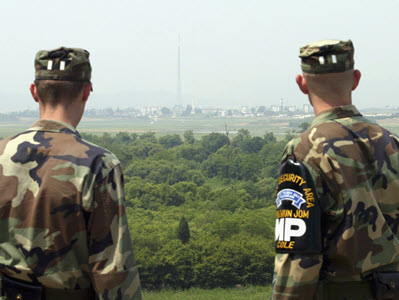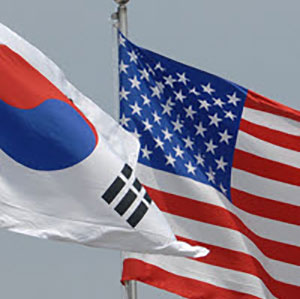An End-of-War Declaration on the Korean Peninsula
Pursuing a Phased Agreement with the Goal of Complete Denuclearization
NBR reached out to several experts in its network to gather perspectives on the politics and strategy of an end-of-war declaration on the Korean Peninsula. The concept of an end-of-war declaration has become a polarizing topic in both Washington and Seoul. This Q&A with Shin-wha Lee is part of the roundtable “The Politics and Strategy of an End-of-War Declaration on the Korean Peninsula” that aims to clarify the key issues in the debate and offer policy options for congressional action.
Under what circumstances would an end-of-war declaration be in the interest of the United States and the Republic of Korea (ROK)?
The recent debate over the end-or-war declaration started with the April 17, 2018, Panmunjom Declaration, which outlined that such a declaration would be concluded by the end of that year. The biggest obstacle is that denuclearization, the most important precondition for the declaration of an end to the war that the current Moon administration intends to pursue, has disappeared. In addition, it is unclear whether an agreement has been reached between South Korea and the United States on the implementation of the declaration.
Recently, Vice Foreign Minister Choi Jong-gun said that there is no disagreement with the United States and that the declaration document is being finalized between the two countries. However, U.S. national security adviser Jake Sullivan has stated that South Korea and the United States disagree about the order, timing, and conditions related to the declaration. This suggests that practical implementation will be difficult.
From the United States’ perspective, it is an important prerequisite for an end-of-war declaration for the Kim Jung-un regime to present a clear denuclearization roadmap to the international community in a form that it can take responsibility for later. However, in the 8th Party Congress speech in January 2021, Kim indicated a change in the country’s strategy (as a nuclear state) that would separate denuclearization from negotiations with Washington and Seoul.
Thus, it seems almost impossible to justify the declaration as a path to denuclearization through steps such as a joint statement with North Korea or certain technical disarmament steps. Only unified, consistent, and strong sanctions from the international community, including the United Nations, can lead to actual denuclearization of North Korea, not a declaration of an end to the war.
How might an end-of-war declaration advance the peace process on the Korean Peninsula? How should parties sequence a declaration with components of a peace regime (including the issue of denuclearization)?
Currently Korean society remains divided on whether to pursue the end-of-war declaration. While proponents of the “entry theory” claim that such a declaration will catalyze denuclearization, supporters of the “exit theory” highlight the importance of verifiable denuclearization over the declaration in ending the long-standing war. The claims of the president, ruling party, and scholars rushing to declare an end to the war underscore how the declaration is viewed as a catalyst for peace on the Korean Peninsula, an inducer for denuclearization, and a facilitator between the two Koreas. They also claim that the declaration would not interfere with the future of the U.S. Forces Korea, the UN command, and the ROK-U.S. alliance because it is a “political” declaration to end the Korean War.
Meanwhile, those critics of the end-of-war declaration condemn the current administration for dichotomously framing proponents of their agenda as “peace forces” and opponents as “peace-breakers.” They emphasize that denuclearization should precede the declaration.
As the declaration became politicized, discussions on denuclearization were set aside and lost priority. President Roh Moo-hyun defined denuclearization as a prerequisite, and President Moon Jae-in also shared such sentiment in 2018. However, the Moon administration altered its posture by characterizing the declaration as a “gateway to denuclearization.” Although the government has an obligation to justify its changed policy stance on important national issues, President Moon has not provided any sufficient explanation.
Therefore, it is of utmost importance to reach a complete agreement between the relevant countries on what the end of the war should be. Through the declaration, military confidence-building measures that go beyond the September 19 Military Agreement must be followed. The meaning of the declaration will fade if military measures are not followed to substantially resolve the military confrontation as well as complete demilitarization of the DMZ through the full-fledged operation of the inter-Korean joint military committee.
Furthermore, if a declaration is to be made, the Moon administration should present a specific direction and consultation structure for the transition to a peace regime on the Korean Peninsula.
What are the primary risks and opportunities surrounding a declaration?
Even if Seoul and Washington reach a diplomatic consensus on the declaration, they must wait for North Korea’s response. Practical implementation may be very difficult given Pyongyang’s uncooperative attitude. North Korea has repeatedly promoted the following preconditions for the declaration: not defining their military actions as provocations, lifting the UN sanctions, and suspending the ROK-U.S. joint military exercise. Indeed, during the 2019 Hanoi summit, North Korea’s interest was focused on lifting sanctions and not on ending the war. Pyongyang’s policy stance thus contradicts the expected effect of “peace” promoted by the proponents of the end-of-war declaration.
President Moon’s willingness to establish a legacy on the Korean Peninsula during his tenure has been guiding South Korea in the wrong direction. While South Korea should be the most important stakeholder in the denuclearization issue, President Moon has shrugged off the problem for the United States and North Korea to resolve. As a result, South Korea has lost its leverage with North Korea, as described by the recently coined term “Korea passing.”
How might the U.S. Congress play a meaningful role in shaping the terms of a declaration or driving a peace process during the Biden administration?
South Korea, North Korea, and the United States should coordinate within a more comprehensive framework. If North Korea–U.S. relations are prioritized, then the inter-Korean relations and ROK-U.S. alliance will become secondary, and South Korea will further lose its place in the discourse. In order to avoid such a diplomatic blunder, the Moon administration must stop making unreasonable attempts to cling on to the end-of-war declaration in a limited time frame and rather prepare to hand over its work to its successors.
If the declaration is eventually agreed to, the U.S. Congress should issue a statement and call for policy action. Specifically, in order to enforce Pyongyang’s faithful implementation of the agreement once reached, it is necessary for the U.S. Congress to urge North Korea to promote internationally credible documentation and legislation.
Of course, the Korean National Assembly should play a leading role in all these processes in cooperation with the U.S. Congress. Unfortunately, however, it cannot be expected to play a proper role in debating the declaration, which is a national priority promoted by President Moon. The Korean National Assembly currently has an overwhelming majority of lawmakers from the ruling party.
In this regard, it is important that the U.S. Congress clearly express its position. After completing its policy review last May, the Biden administration announced that it would pursue a “phased agreement” with the goal of complete denuclearization of North Korea. North Korea has maintained an attitude of prioritizing the improvement of relations with the United States, and selectively using South Korea, an “easy target,” as a means to achieve that goal.
Therefore, the U.S. Congress should fully endorse the Biden administration’s North Korea policy, and at the same time strongly urge that North Korea’s sincerity about denuclearization must be reaffirmed before President Moon’s hasty declaration attempt at the end of his term. And it would be necessary to deliver a clear message to the Korean National Assembly through a bipartisan statement of the U.S. Congress that a rough roadmap, including a phased agreement on denuclearization and corresponding measures, should be established before the declaration.
Shin-wha Lee is a Professor in the Department of Political Science and International Relations and the Director of the Peace and Democracy Institute at Korea University. She is also President of the Korean Academic Council on the United Nations System. Previously, she was a special adviser of the UN Secretary-General Kofi Annan’s independent inquiry into Rwandan genocide, a board member of the UN Peacebuilding Fund, and a chair’s adviser of the East Asia Vision Group.
This interview was conducted by Joshua Nezam, who is director of congressional affairs at NBR.
Read other expert interviews from the roundtable “The Politics and Strategy of an End-of-War Declaration on the Korean Peninsula“



 The Politics and Strategy of an End-of-War Declaration
The Politics and Strategy of an End-of-War Declaration
